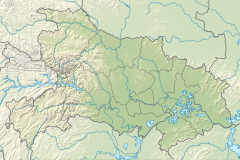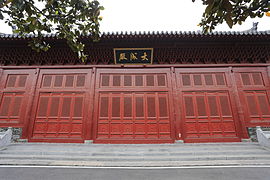Jingzhou Confucius Temple
| Jingzhou Confucius Temple | |
|---|---|
 Dacheng Hall of Jingzhou Confucius Temple | |
| Religion | |
| Affiliation | Confucianism |
| Location | |
| Location | Jingzhou, Hubei[1] |
| Geographic coordinates | 30°21′16″N 112°10′48″E / 30.35444°N 112.18000°E |
 | |
Jingzhou Confucius Temple[2] (simplified Chinese: 荆州文庙; traditional Chinese: 荊州文廟), or Jingzhou Confucian Temple, previously Confucian Temple of Jiangling County (江陵县文庙),[3] is a Confucian temple[4] located in Jingzhou Experimental Middle School (荆州市实验中学),[5] Jingzhong Road, Jingzhou District, Jingzhou City, Hubei Province.[6]
Completed in 1725, Jingzhou Confucius Temple was severely damaged by the invading Japanese army during the Second Sino-Japanese War, and then underwent restorations. It is the only existing Confucian temple in Jingzhou.[7]
History
[edit]The construction of Jingzhou Confucius Temple began in the 60th year of the Kangxi in the Qing Dynasty (1721), [8] and was completed in 1725.[9]
During the Second Sino-Japanese War, when the Japanese invasion army occupied Jingzhou, the Jingzhou Confucius Temple was destroyed and the relics inside the temple were looted by the Japanese army. Now, only the Dacheng Hall (大成殿) and the Lattice Star Gate (棂星门) remain.[10]
Conservations
[edit]After the founding of the People's Republic of China, the Jingzhou local government repaired the Jingzhou Confucius Temple twice in 1953 and 1965. [11]
In 1960, the original Jiangling County Government listed Jingzhou Confucius Temple as a key cultural relic protection unit,[12] and in 2008 it was designated as a provincial cultural relic protection unit in Hubei Province.[13]
Gallery
[edit]References
[edit]- ^ Anna Sun (2011-01-11). Contemporary Confucius Temples Life in Mainland China - Brill. Brill. doi:10.1163/9789004374966_009. ISBN 9789004374966. S2CID 201434391. Retrieved 2 March 2021.
- ^ Sébastien Billioud (26 July 2018). The Varieties of Confucian Experience: Documenting a Grassroots Revival of Tradition. Brill Publishers. pp. 230–. ISBN 978-90-04-37496-6.
- ^ Hubei Literature, Issues 146-149. Hubei Literature Press. 2003. pp. 9–.
- ^ Anna Sun (2018-05-19). "The Varieties of Confucian Experience" (PDF). dukespace.lib.duke.edu. Retrieved 2 March 2021.
- ^ "General Office of the People's Government of Hubei Province on the announcement of the scope of protection of cultural relics protection units in Hubei Province and construction control zone notice". www.hubei.gov.cn. 2017-08-30.[permanent dead link]
- ^ Gao Shilin (1 January 2017). Southern Perfection: the Ancient City Walls of Jingzhou. Hubei People's Publishing House. pp. 161–. ISBN 978-7-216-09148-0.
- ^ "A plaque from the Qing Dynasty was found during the restoration of Jingzhou Confucius Temple". Jingzhou News Network. 2012-02-28. Archived from the original on 2012-06-23. Retrieved 2021-03-02.
- ^ "Find and visit old buildings in Jingzhou". Jingzhou News Network. 2016-04-26.
- ^ "PROJECT INFORMATION DOCUMENT (PID) CONCEPT STAGE" (PDF). World Bank. 1 Jun 2015.
- ^ "Tracing history in architecture". wqj.jingzhou.gov.cn. 2017-09-14.
- ^ "Dacheng Hall repair project started with a budget investment of 900,000 yuan". Jingzhou News Network. 2011-08-09.[permanent dead link]
- ^ "Jingzhou Confucius Temple began to be repaired". Jingzhou News Network. 2011-01-11. Archived from the original on 2012-07-18. Retrieved 2021-03-02.
- ^ "Many historical buildings in Jingzhou city will be protected". www.hubei.gov.cn. 2011-09-02.[permanent dead link]




